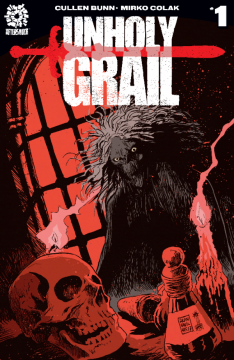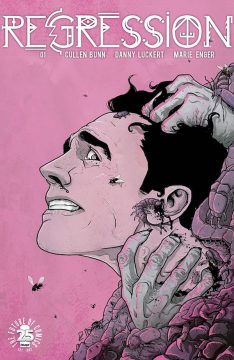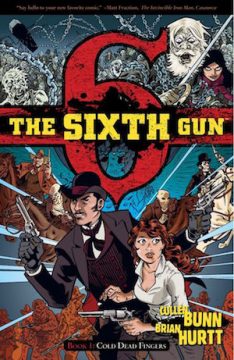“There are so many outlets for indie comics” Cullen Bunn talks Regression and the state of the indies
 Our US correspondent Rebecca Hail caught up with The Damned and The Sixth Gun creator Cullen Bunn at the Salina Comic Con. We talked about his new book Regression from Image Comics, plus the inspiration behind his creator owned titles and his take on the state of the indies.
Our US correspondent Rebecca Hail caught up with The Damned and The Sixth Gun creator Cullen Bunn at the Salina Comic Con. We talked about his new book Regression from Image Comics, plus the inspiration behind his creator owned titles and his take on the state of the indies.
 What independent comics have you been working on?
What independent comics have you been working on?
Cullen Bunn: So lately I’ve just launched my first Image series titled Regression which is an ongoing horror stories about past life regressions gone terribly, terribly wrong. I’m also doing a book called The Unsound for Boom which just launched. Which is a story of a young nurse who is taking her first job and she just happens to take it at a haunted insane asylum. That’s how it starts and it just gets deeper and deeper, and kinda blows out into this really bizarre story. We just announced with Aftershock, I’m doing a book called Unholy Grail which is the legend of King Arthur if the legend of King Arthur was a horror story. And they just announced a book called Dark Ark which I am doing, which is the secret story of the second ark. We know about Noah’s ark and how he had an ark with all the animals, what we didn’t know there was a second ark with all the supernatural creatures that was also at sea at the same time. And I’m still working on The Damned for OniPress, and Harrow County for Dark Horse too.
So, lots of independant stuff in the works right now. Which genre do you find yourself most drawn to?
CB: Horror is probably where I feel the most comfortable I think. I don’t know why, it has something to do with when I grew up listening to ghost stories and watching bad horror movies I guess. I never really envisioned myself really veering into horror, specially not in my early formative years. When I was 18 I decided I was going to be a special effects makeup artist, and that got me into horror because horror movies was where I could do practical makeup effects. And so I got really into horror at that point and I was really into movies, and that kinda spread out into reading novels, and that spread out into horror in comics. Since that time that’s just been where my heart and soul have been.
Do you have any books or authors you find yourself going back to to draw inspiration from?
CB: Oh yeah, a ton . I read a lot of Stephen King, Clive Barker, and I got back to Clive Barker’s Books of Blood. Those stories I can read again and again. And Robert McCammon who started in horror and has now moved into more mystery, supernatural thriller, historical fiction. Joe R. Lansdale, and then in fantasy side Michael Moorcock, I can see myself reading a lot of his stuff again.
 When you were first starting out, were you doing it for the fun of it as an outlet, or looking to make a life long career?
When you were first starting out, were you doing it for the fun of it as an outlet, or looking to make a life long career?
CB: Even from a young age, when I was a kid, I mean, I started writing a novel when I was in sixth or seventh grade, and I was doing comics on the side, trying to write and draw. I always had the hope and dream that I could do this as a living. It took me a long time. First of all, you have to get better. Second of all, I didn’t know how to submit to comic companies, I didn’t know how to get my work in front of them. I was sending proposal after proposal, to Marvel and DC for stories about Ghost Rider, Spiderman, Deadpool, and all these other characters, but I didn’t know how to submit so I was just getting rejection letter after rejection letter. It took me a while was the way to break in with Marvel and DC was to do something independent, something that is wholly your own, and completely your own voice. Once I realized that , and that’s where I really started focusing things started happening in a way that I was able to make this my full-time career.
Do you feel more comfortable in the indie scene of comics, or do you feel more comfortable in the Marvel, DC, IDW World?
CB: They serve two very different needs I guess. With Marvel, I’m writing characters that I’ve always loved. I grew up loving these characters and I’m able to contribute something to that universe, and that’s very rewarding in its own way. When you talk about independent stuff it’s rewarding on a completely different level because that’s solely my work and the work of my collaborators. If people react to that in a big way, that a pretty wonderful feeling.
 How do you see the indie side of comics? Stable, declining, or otherwise?
How do you see the indie side of comics? Stable, declining, or otherwise?
CB: And yes, I think indie comics are fine because there are so many outlets for them and so many outlets for different kinds of comics. Honestly, people could do a comic without a publisher, they could self publish it very easily with crowdfunding and things like that, or the web just in general. They can do it themselves. Which is something I always tell people who are trying to break in. That they shouldn’t wait for the approval of a Marvel or DC or any other publisher, they should just do it themselves if nothing else. The approval of the publisher when you’re first starting out and getting something done doesn’t it’s nice if you can get it, but you don’t have to have it. You shouldn’t let that hold you up.
Is there one comic in particular that you are really proud of. That you just want to share it with everyone?
CB: That’s a tough question. That’s a hard one. It’s like you’re asking me to choose among my favorites. So I can say The Sixth Gun was a favorite, because I was able to with Brian Hurr the artist take it from issue one to issue fifty and tell the story we wanted to tell. So that’s a pretty high up there. That’s going to be hard to knock off the pedestal. At the same time, Harrow County is a book I am very proud of and I think is a really great book and could possibly compete with The Sixth Gun for my favorite. And Regression would be awesome too. They are all my favorites and they should be everyone’s favorites too.
You can purchase Regression from ComiXology for £2.49 from ComiXology



December 19, 2025 @ 11:15 pm
Meiner Meinung nach bietet GG.BET mit das beste und vielfältigste
Casino Spiele Angebot überhaupt. Mein GG.BET Test ist nicht nur aufgrund des überwältigenden Willkommensbonus
recht positiv ausgefallen. Die Bedingungen und Voraussetzungen sind
begreiflich und übersichtlich und du brauchst nicht zu
lange suchen, um alle wichtigen Informationen zu finden.
Ob Sie nun Einzel- oder Mehrfachwetten bevorzugen, bei GGBet ist für jeden etwas dabei.
Bei GGBet Deutschland können Sie auch Sportwetten mit großartigen Quoten und vielen spannenden Märkten genießen. Melden Sie sich jetzt
an und genießen Sie den Nervenkitzel von Sportwetten noch
heute. Bei GGBet können Sie mit nur wenigen Mausklicks Einzel-
oder Mehrfachwetten auf jede Sportart platzieren. GGBet in Deutschland ist die perfekte Wahl für Online-Sportwetten. Verpassen Sie es also nicht – erleben Sie
jetzt Online-Sportwetten in ihrer besten Form!
References:
https://online-spielhallen.de/cosmo-casino-freispiele-ihr-weg-zu-gewinnen-und-spas/
December 26, 2025 @ 3:52 pm
Discover the secrets of 999,999,999,999,999,999,999 with
our full breakdown of its prime factors, divisors, and mathematical properties…
This visualization shows the relative proportions of its
7 prime factors (outer circle), plus the relationship between these and its 256 divisors.
You could say that a number is made or ‘composed’ of its prime factors.
Its factors, divisors, and base properties can show some interesting behavior.
It has a total of two hundred fifty-six divisors. It is composed of seven distinct prime numbers multiplied together.
Here we have made a list of the currency names you would need to write spellings in order to deposit money against your
currency cheques, DD, loan payments or more. Prime factors of a number are the prime numbers that multiply together to form that number.
Like all numbers, it has a distinctive mathematical structure.
References:
https://blackcoin.co/ripper-casino-login-australia-complete-guide/
December 27, 2025 @ 11:58 am
Crown hotels include premium rooms with contemporary décor, lush and comfortable furnishings, and multiple amenities.
Thus, once done at the gaming tables, there will be plenty more for patrons to do.
Multiple fine dining and casual restaurants, as well as various bars and nightclubs,
will be included in the Crown Sydney.
Nestled in the heart of Barangaroo, Crown Casino Sydney delivers a refined gaming experience like no other.
Located on Sydney’s exclusive waterfront, Crown delivers stunning views
and direct access to the city’s top cultural and business attractions.
Experience premium gaming, fine dining, and luxurious hospitality in the heart of Sydney Harbour.
Just steps from Sydney Harbour and Darling Harbour precinct, the casino is surrounded by
fine restaurants, designer boutiques, and panoramic views — offering
an unmatched entertainment destination. Academic
researchers have suggested that while the casino is initially not licensed to offer
poker machines, it will inevitably gain a licence in future years.
It was so relaxing looking at Sydney’s iconic harbour while enjoying a drink from up there.
It’s easy to get to, with various transportation options readily available.
Crown Sydney Casino is located in Barangaroo, Sydney.
References:
https://blackcoin.co/top-online-casinos-and-games-in-new-zealand/
December 29, 2025 @ 6:02 am
paypal casino online
References:
http://www.cubexpromax.com
December 29, 2025 @ 6:27 am
online betting with paypal winnersbet
References:
casjobs.in